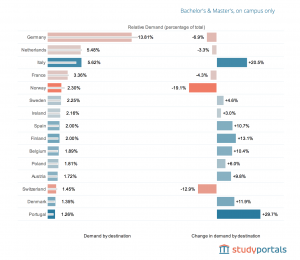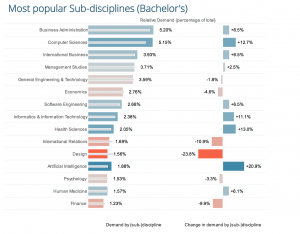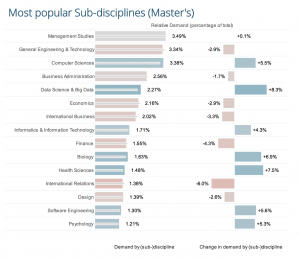Students from Pakistan and Bangladesh are driving interest in education across continental Europe – a region that is maintaining a “strong appeal” for international students – but government policy, among other factors, may be impacting students’ choices, according to new research.
News and business analysis for Professionals in International Education
Have some pie!
Report reveals widening European interest and shift towards STEM
 Italy saw a strong relative change in demand on a global level, with Studyportals recording a +20.5% increase in interest in the past 12 months. Photo: pexels
Italy saw a strong relative change in demand on a global level, with Studyportals recording a +20.5% increase in interest in the past 12 months. Photo: pexels Additionally, program preference is shifting towards artificial intelligence, data science & big data, business intelligence & analytics, entrepreneurship and engineering management.
Analysing data collected in the year up to May 2023, the Studyportals Destination Europe report delves into trends in master’s and bachelor’s programs, as well as taking a closer look at the business and management discipline – which the paper noted as most popular for international students in general.
One in five students looking to study in Europe are interested in the discipline, the company noted.
While Germany “holds significant global market share of student interest”, the analysis found a “drop in relative demand” for its programs, while Norway had seen the “largest decline” in relative demand. The drop is likely influenced by the introduction of tuition fees, the paper said.
At the other end of the spectrum, Italy is continuing to grow in its popularity among international students, at both the bachelor’s and master’s levels.

Along with Italy, Ireland, Spain, Finland, Belgium, Poland and Austria all saw increases in interest. Photo: Studyportals
The research split student interest in disciplines in bachelor’s and master’s.
Studyportals noted the annual 50+ million unique visitors across its nine portals allows the company a unique perspective on student demand, which it can drive down to the city level, the destination of interest and study disciplines.
“By understanding the preferences of prospective students, universities can strategically develop and promote relevant programmes, ensuring they meet the evolving needs of international students,” the report read.
At bachelor’s level, design related programs saw “significant decline” in interest, with AI programs seeing notable increases.
Similarly at the master’s level, interest in international relations dropped, with students turning toward data science & big data type programs.
While excluded from the analysis due to the prevalence of English-taught programs, the report noted a 13.1% drop in interest in bachelors programs in the UK compared with a 6.1% rise in masters.
The trend in interest analysis corroborates with warnings that the UK is at operational risk as result of international students increasingly opting for master’s programs over bachelor’s level courses.
At bachelor’s level, researchers tracked a 19.7% drop in interested in Norway and a 5.5% fall in the Netherlands, while “small to moderate” increases were recorded elsewhere. Finland (+36.7%), Austria (+32%) and Belgium (26.4%) “led the pack” in regards to interest, Studyportals noted.
Among master’s programs, Norway also saw a 18.2% decline but the paper noted a “different pattern” compared with bachelor’s programs. Both France (-9.9%) and Germany (-6%) saw declines, with Czechia, Hungary and Italy all witnessing rising interest.
“You can see that Bangladesh and Pakistan have increased their share of the interest”
Portugal saw a substantial increase in interest at both bachelor’s and master’s level, the paper added.
At both levels, the proportion of student interest from India tracked has declined overall since 2019. This may be of interest to note as governments including Australia, the UK and the US seek to build closer ties with the country that recently became the world’s most populous.
“Although India generates the largest share of relative demand [at bachelor’s level], this fluctuates drastically and has gradually declined overall,” the report noted. “Conversely, you can see that Bangladesh and Pakistan have increased their share of the interest.”
The research tracks a similar trend in master’s, with India showing a “general decline in interest year-on-year”, with Bangladesh and Pakistan, alongside students in Turkey and Iran, showing “strong demand to study master’s programs”.
At bachelor’s level, computer science saw the most growth (+12%) and business increased slightly, while social science saw “a moderate decline” despite maintaining a large proportion of the overall demand.
Business & management remains the most popular discipline for master’s students, followed by social sciences and engineering & technology despite all three seeing mild declines in student interest.
Among specific programs, interest in artificial intelligence bachelor’s programs surged by 20.9% over the last year, with health sciences, computer science and informatics & information technology all seeing jumps in interest.
STEM also dominated in master’s programs with data science & big data, health science, biology and software engineering among courses that saw increases in interest.
For business programs, Studyportals recorded a shift away from the top three European master’s destinations – Germany, France, and the Netherlands. Italy, on the other hand, has seen interest in master’s programs in business over the past year rise by 21.5%.
Italy also saw increases in interest in business bachelor’s programs, while Finland – also with a lower starting point – led across the continent with a 60% year-on-year interest increase.
Spain, Denmark and France also all saw moderate growth for their bachelor’s business programs.
Still looking? Find by category:




